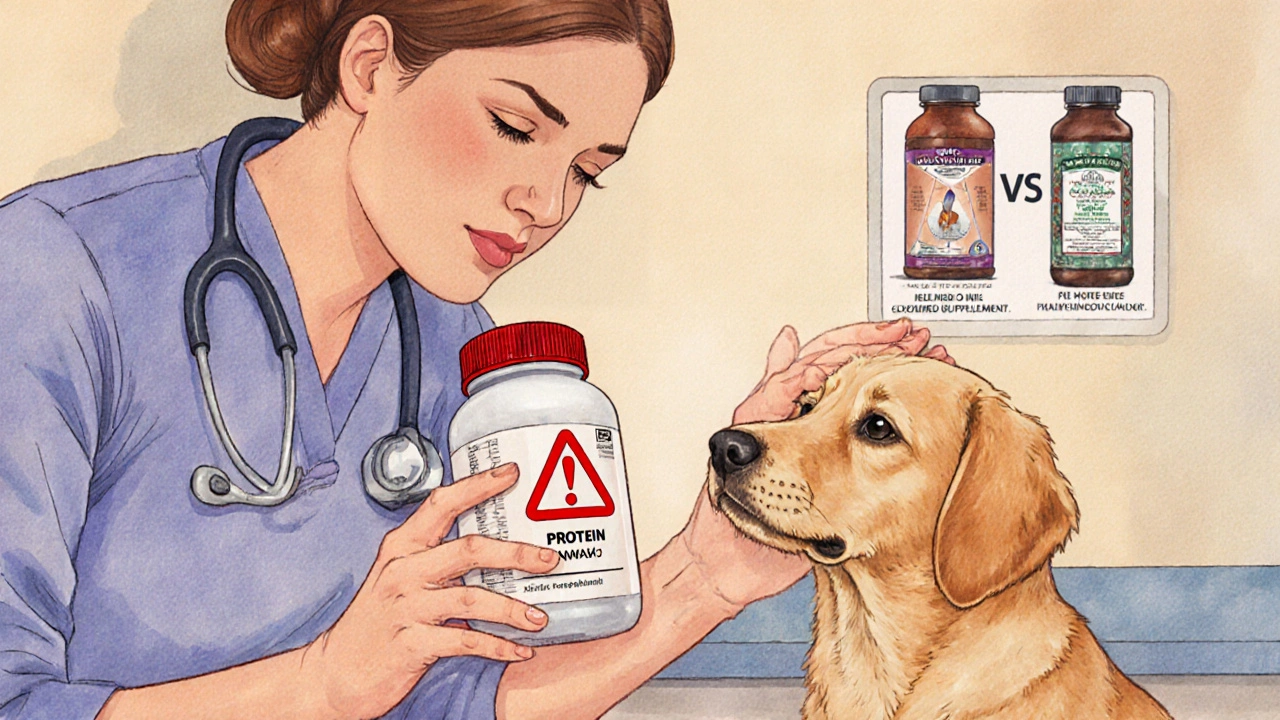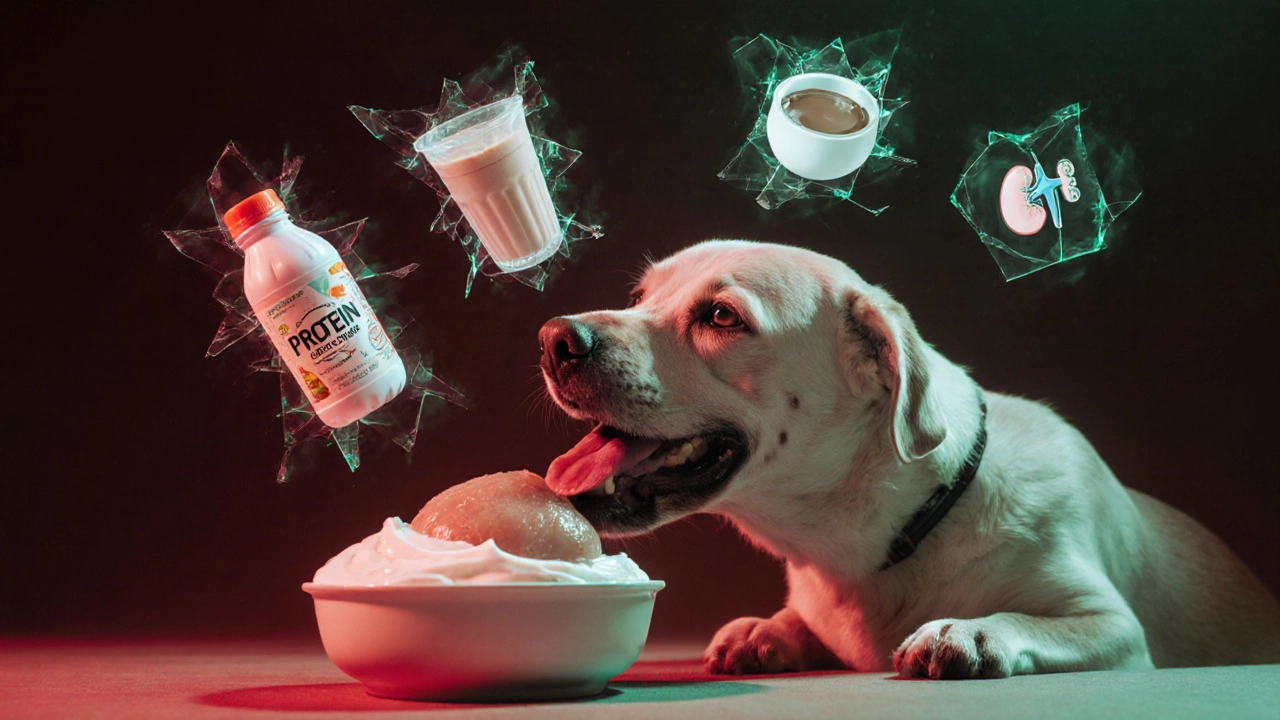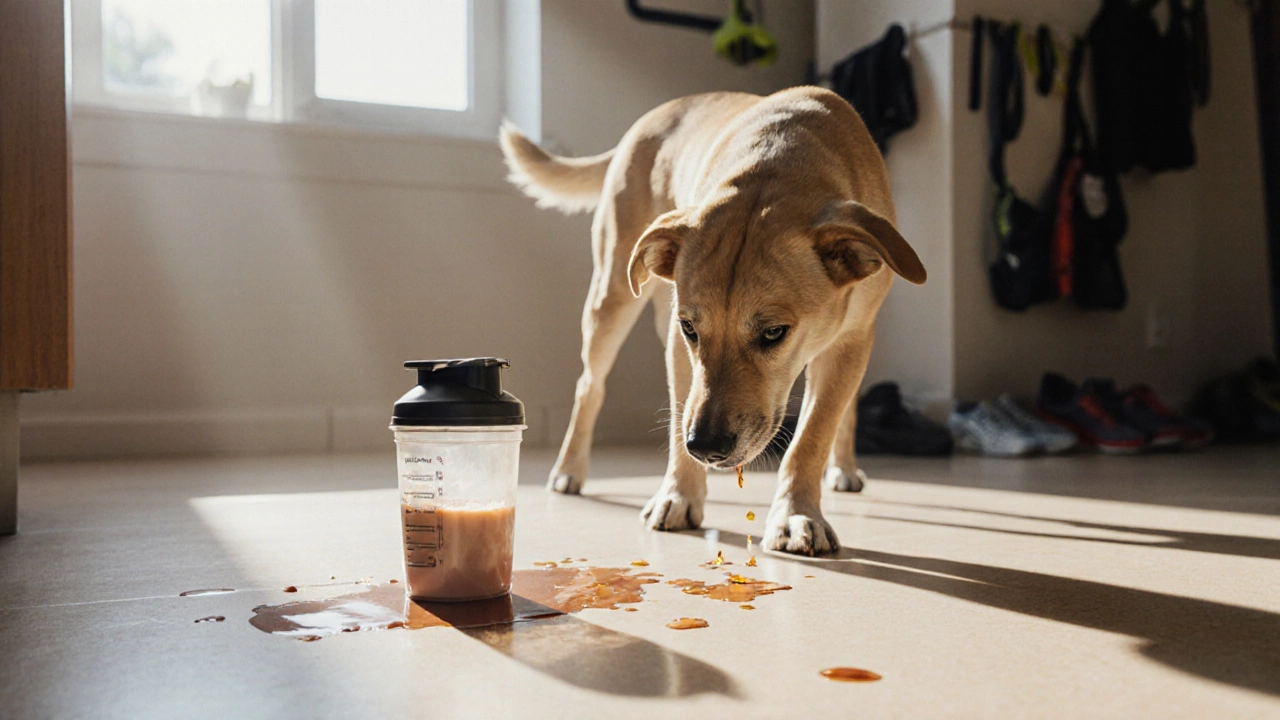Dog Protein Calculator
Proper Protein Needs Calculator
Enter your dog's details to see their daily protein requirements.
Many dog owners wonder if protein shakes, popular with humans, are safe for their pets. The short answer? Protein shakes aren’t designed for dogs-and giving them one can do more harm than good.
Why protein shakes aren’t made for dogs
Protein shakes for people are built around human biology. They often contain whey, casein, or plant-based proteins mixed with artificial sweeteners, thickeners, caffeine, and added sugars. These ingredients aren’t just unnecessary for dogs-they can be dangerous. A typical whey protein shake might have 20-30 grams of protein per serving, which sounds helpful until you realize a 20kg dog only needs about 18-25 grams of protein per day total, spread across meals. Giving a shake on top of regular food can easily push them into protein overload.What happens if your dog drinks a protein shake?
Dogs don’t process human supplements the same way we do. If your dog licks up a protein shake, here’s what could happen:- Upset stomach: Lactose in whey protein can trigger diarrhea or vomiting in dogs, since most adult dogs are lactose intolerant.
- Artificial sweeteners: Xylitol, common in sugar-free shakes, is deadly to dogs-even a tiny amount can cause a rapid drop in blood sugar, seizures, or liver failure.
- Excess protein: Too much protein strains the kidneys and liver, especially in older dogs or those with pre-existing conditions.
- Weight gain: Shakes are calorie-dense. Add them to your dog’s diet without cutting back on food, and you’ll see belly fat creep up fast.
A 2023 study from the University of Edinburgh’s Veterinary Nutrition Lab tracked 142 dogs that accidentally ingested human protein supplements. Nearly 60% developed gastrointestinal distress within 6 hours. Eight required emergency treatment due to xylitol poisoning. No dog recovered without veterinary intervention.
When might a dog actually need extra protein?
Not all dogs need the same amount. Puppies, pregnant females, working dogs (like sled or search-and-rescue teams), and dogs recovering from surgery or illness may need more protein. But even then, the solution isn’t a shake.Real food works better. High-quality dog food labeled as “complete and balanced” already has the right protein levels. If your vet says your dog needs more, they’ll recommend:
- Lean cooked chicken or turkey
- Boiled eggs
- Plain Greek yogurt (lactose-free, if needed)
- Specialized canine protein supplements-like powdered bone broth or vet-approved amino acid blends
These are digestible, safe, and come without hidden toxins. A 2024 survey of 300 UK vets found that 92% recommended whole-food protein boosts over commercial human supplements for dogs.

What about dog-specific protein powders?
Yes, they exist. Brands like Canine Protein Plus is a vet-formulated canine protein supplement made with hydrolyzed chicken protein and no artificial additives, NutriVet Canine Protein is a low-carb, grain-free powder designed for active and senior dogs, and ProDog Rebuild is a recovery-focused supplement with added glucosamine and omega-3s are made specifically for dogs.These products:
- Use animal-based proteins dogs can digest easily
- Have no xylitol, artificial colors, or sweeteners
- Include added nutrients like taurine, chondroitin, or probiotics
- Come with dosing instructions based on weight
Still, don’t just buy one off the shelf. Always talk to your vet first. Some dogs with kidney disease, liver issues, or pancreatitis need to limit protein-even if it’s “dog-safe.”
What to do if your dog already drank a protein shake
If your dog took a sip or licked up a whole shake, don’t panic-but act fast.- Check the ingredient list. Look for xylitol, caffeine, chocolate, or excessive sugar.
- If xylitol is listed, call your vet or the Animal Poison Control Center immediately-even if your dog seems fine.
- If it’s just whey and sugar, monitor for vomiting, diarrhea, or lethargy over the next 12 hours.
- Don’t induce vomiting unless instructed by a professional. Some ingredients can cause more damage coming back up.
- Keep the shake container so your vet can check the exact ingredients.
Most dogs recover fully if treated early. But waiting too long can turn a simple stomach upset into a life-threatening emergency.

Safe alternatives to protein shakes for dogs
If you’re trying to help your dog gain muscle, recover from illness, or support joint health, skip the shake and try these vet-approved options:- Boiled chicken breast: Plain, unseasoned, and easy to mix into food. A 100g serving gives your dog 31g of protein.
- Plain cottage cheese: Low in lactose and rich in calcium. Great for older dogs needing extra protein.
- Whole eggs: One egg has 6g of protein and essential amino acids. Cook it to avoid biotin deficiency.
- Commercial canine protein powders: Only if recommended by your vet. Look for products with AAFCO approval.
- Bone broth: Homemade or vet-approved. Adds hydration and amino acids without overload.
These are natural, digestible, and don’t carry the risks of human supplements. Plus, your dog will actually enjoy them.
Final verdict: Keep protein shakes off the dog’s bowl
Protein shakes aren’t just useless for dogs-they’re risky. Even a small amount can trigger serious health issues. Your dog doesn’t need gym-style supplements. They need balanced meals, fresh water, and regular vet check-ups.If you’re worried your dog isn’t getting enough protein, talk to your vet. They’ll help you adjust their diet safely-without risking poison, kidney damage, or a trip to the emergency clinic.
When it comes to your dog’s health, what works for you doesn’t always work for them. Stick to food made for dogs-and skip the human protein powders.
Can dogs have whey protein powder?
Whey protein powder is not safe for most dogs. Many contain lactose, which dogs can’t digest well, leading to diarrhea and gas. Some also have xylitol or artificial sweeteners, which are toxic. Even if the powder is plain, the high protein concentration can overload your dog’s kidneys. Stick to dog-safe protein sources like cooked chicken or vet-approved supplements.
What if my dog ate a protein shake with xylitol?
Call your vet or an emergency animal poison control center immediately. Xylitol causes a rapid drop in blood sugar within 10-60 minutes, which can lead to weakness, seizures, or coma. It can also cause liver failure within 24-72 hours. Do not wait for symptoms to appear. Time is critical.
Are there any safe protein supplements for dogs?
Yes, but only vet-recommended ones. Look for products labeled as AAFCO-approved and made specifically for dogs, like Canine Protein Plus, NutriVet Canine Protein, or ProDog Rebuild. These use hydrolyzed animal proteins, no artificial sweeteners, and include nutrients tailored to canine needs. Never use human supplements as a substitute.
How much protein does a dog really need?
Adult dogs need about 18-25% protein in their dry food by weight, which translates to roughly 18-25 grams per day for a 20kg dog. Puppies, pregnant dogs, or highly active dogs may need up to 30%. But these needs are met through balanced dog food. Adding extra protein from shakes or powders is rarely necessary-and often harmful.
Can protein shakes cause kidney problems in dogs?
Yes, especially in older dogs or those with existing kidney disease. Too much protein forces the kidneys to work harder to filter out waste products like urea. Over time, this can accelerate kidney damage. Dogs with kidney issues often need a low-protein diet, not more. Always check with your vet before adding any protein supplement.
Should I give my senior dog a protein shake to help with muscle loss?
Not a human protein shake. Instead, ask your vet about a senior-specific diet or a vet-approved canine protein powder. Muscle loss in older dogs is common, but it’s best managed with moderate protein increases from whole foods like boiled eggs or lean meat, plus gentle exercise. Protein shakes often contain fillers and additives that can stress aging organs.
Next steps if you’re concerned about your dog’s protein intake
1. Check your dog’s current food label. Look for the guaranteed analysis-protein percentage should be listed. 2. Weigh your dog. Use an online calculator or your vet’s scale to find their ideal weight range. 3. Schedule a check-up. Ask your vet to assess muscle mass, kidney function, and overall nutrition. 4. If your vet recommends extra protein, get a vet-approved supplement-not something from the gym aisle. 5. Keep human supplements locked away. Dogs are curious, fast, and good at finding snacks.Your dog doesn’t need to look like a bodybuilder. They need to be healthy, active, and pain-free. That starts with food made for their species-not yours.








